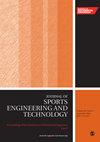Acceleration spikes and attenuation response in the trunk in amateur tennis players during real game actions
IF 1.1
4区 医学
Q4 ENGINEERING, MECHANICAL
Proceedings of the Institution of Mechanical Engineers, Part P: Journal of Sports Engineering and Technology
Pub Date : 2023-03-07
DOI:10.1177/17543371231157959
引用次数: 0
Abstract
Although there are numerous locomotion studies analyzing the degree of attenuation of the acceleration spikes in the lower limbs and the trunk, few of these studies relate to tennis, where a high percentage of injuries occur in these body segments. The aim of this study was to describe the acceleration spikes and the attenuation response along the trunk, in real game actions. For this purpose, accelerometers were placed on the lower trunk, the upper trunk, and the head on a sample of 19 players while playing tennis matches. An average of 530 ± 146 acceleration spikes per match were selected in the upper trunk and a clear attenuation response between the upper trunk and the head was found (acceleration spike magnitude was approximately 25 m/s2 in the upper trunk and approximately 20 m/s2 in the head; p < 0.05; with attenuation percentages above 15%). In all players acceleration spikes of the head were below lower and upper trunk acceleration ( p < 0.05 in all repeated measures ANOVAs and effect sizes were above 0.8, or large effect sizes). However, between the lower trunk and upper trunk no clear attenuation was found and although in some players the impact peaks were higher in the lower trunk ( p < 0.05) the effect sizes were negligible or medium (Cohen d < 0.5). In other players the upper trunk peaks were higher than the lower trunk peaks ( p < 0.05) and in a few players there was no significant difference ( p > 0.05). The attenuation in the upper trunk, probably serves as a head protection/stabilization mechanism and more studies are needed to analyze the biomechanics actions underlying this attenuation response.业余网球运动员在真实比赛动作中躯干加速度尖峰和衰减响应
尽管有许多运动研究分析了下肢和躯干加速度峰值的衰减程度,但这些研究很少与网球有关,因为网球运动中这些身体部位的损伤比例很高。本研究的目的是描述在真实游戏动作中沿主干的加速尖峰和衰减响应。为此,研究人员在19名网球运动员的下躯干、上躯干和头部放置了加速度计。结果表明,上肢和头部之间存在明显的衰减响应(上肢和头部的加速度峰值量级分别约为25 m/s2和20 m/s2;p 0.05)。上躯干的衰减可能是头部保护/稳定机制,需要更多的研究来分析这种衰减响应背后的生物力学作用。
本文章由计算机程序翻译,如有差异,请以英文原文为准。
求助全文
约1分钟内获得全文
求助全文
来源期刊

Proceedings of the Institution of Mechanical Engineers, Part P: Journal of Sports Engineering and Technology
ENGINEERING, MECHANICAL-SPORT SCIENCES
CiteScore
3.50
自引率
20.00%
发文量
51
审稿时长
>12 weeks
期刊介绍:
The Journal of Sports Engineering and Technology covers the development of novel sports apparel, footwear, and equipment; and the materials, instrumentation, and processes that make advances in sports possible.
 求助内容:
求助内容: 应助结果提醒方式:
应助结果提醒方式:


